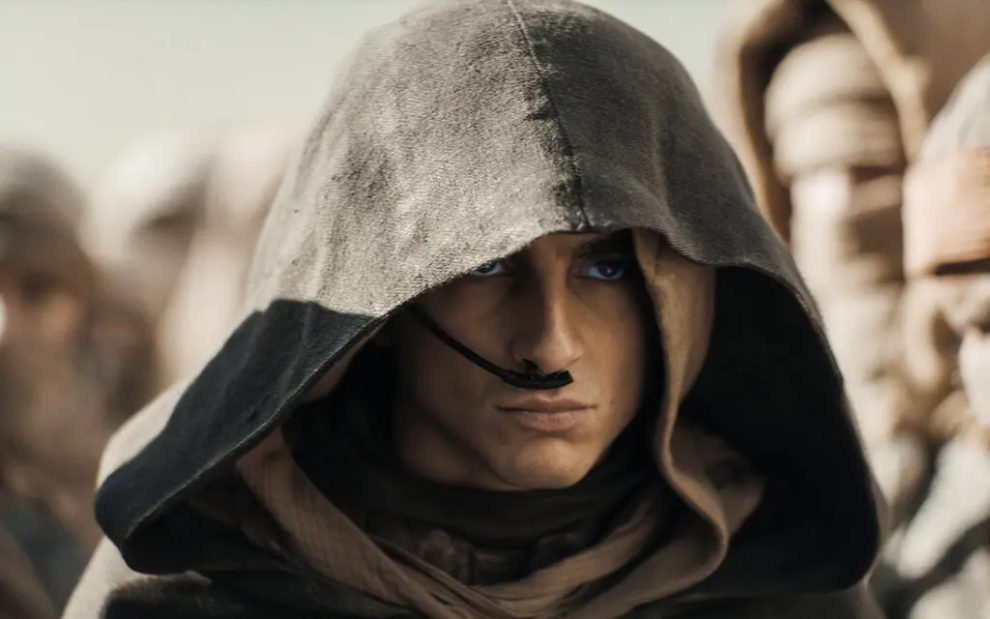The inevitable analogy of Denis Villeneuve’s Dune: Part Two as The Empire Strikes Back to Dune: Part One’s Star Wars was recently highlighted by Christopher Nolan. The Empire Strikes Back has become the paradigmatic genre sequel that surpasses the original, and the standard by which every ambitious second film in a series is measured. And the debt of George Lucas’s Star Wars mythos to Frank Herbert’s Dune novels (a corrupt galactic empire, a quasi-religious order with mind-control powers, etc.) is substantial enough to make comparisons unavoidable. When the sequel depicts the young protagonist going into hiding, undergoing intense training and visionary trials, and eventually confronting a terrible revelation about his ancestry—all visualized on an overwhelming scale, with images of staggering power and utterly persuasive visual effects—the comparison becomes almost redundant.
Yet it would be equally true, if not truer, to call Villeneuve’s Dune movies a kind of anti-Star Wars. I’m tempted to call them the definitive anti-Star Wars movies, and Dune: Part Two the anti-Empire Strikes Back. Indeed, to speak as I did above of the Star Wars mythos suggests the characterization of the Dune saga as an anti-myth. For all that Lucas drew from Dune in crafting his galaxy far, far away, the whole outlook and tone of Star Wars owes more to inspirations celebrating the triumph of good over evil, from conventional Westerns and serialized sci-fi swashbucklers to J.R.R. Tolkien’s implicitly Catholic The Lord of the Rings. By the end of Dune: Part Two, it’s clear that while the idea of “the triumph of good over evil” is popular in some regions of the Dune universe, that idea is a cruel lie in a harsh cosmos with no lack of overwhelmingly evil forces and Machiavellian power players, but a dearth of powers worth rooting for.
Villeneuve’s two-part story offers a “hero’s journey” story that throws a deeply skeptical light on the very idea of heroism; an instance of what anthropologist Manvir Singh dubbed the “sympathetic plot” with a protagonist who is in some ways strikingly unsympathetic. And while the Jedi mysticism of Star Wars could be called, if not pro-religious, at least “spirituality-positive,” the Dune saga offers a mixed critique of Abrahamic-style faith. In Star Wars, skeptical characters who mock “sad devotion” or “hokey religions” sooner or later learn the error of their cynicism. In Dune: Part Two, warnings like “If you want to control people, you tell them a messiah will come…they’ll wait for centuries” and “This prophecy is how they enslave us!” come from the most sympathetic and grounded character, the young Fremen woman Chani, played by Zendaya.
At the same time, perhaps reflecting the director’s mixed feelings about his Catholic upbringing, faith in Villeneuve’s Dune films is double-edged. While religion can function as a tool of manipulation and oppression, it can enable people to do the otherwise impossible, such as survive in the harshest regions of the desert planet of Arrakis. It’s no coincidence that it’s the “uninhabitable” south that we find the most devout Fremen, the ones waiting for a messiah figure. Faith can also be a force of resistance, as Florence Pugh’s Princess Irulen points out to her father, Christopher Walken’s Emperor, warning him against using military force against devout opponents: “You underestimate the power of faith.”
Dune: Part Two draws overtly on one of Herbert’s key inspirations, David Lean’s iconic Lawrence of Arabia: another quasi-messianic tale about a privileged imperialist going native in the desert and galvanizing a guerrilla resistance in a holy war that never delivers on its glorious promise. There are also echoes of Nazi propagandist Leni Riefenstahl’s Triumph of the Will and Olympia in scenes set on the home world of the fascistic Harkonnens, who call the Fremen “rats” and pursue a genocidal campaign against them. (Notably, while Star Wars deployed Nazi stylings for the evil Empire, it also blithely borrowed from Riefenstahl’s playbook for the 1977 film’s triumphant award-ceremony finale.)
Part One introduced Timothée Chalamet’s young Paul Atreides struggling with his dual birthright as the heir of the powerful House Atreides and the son of a matriarch of the Bene Gesserit, an influential sisterhood inspired by both female and male religious orders, crossed with Herbert’s devout Catholic aunts who were responsible for his Jesuit education. (“Gesserit” is derived from “Jesuit,” and the order’s leader is called “Reverend Mother.”) As such, Paul is a product of a clandestine, long-term breeding program designed to create a superhuman called the Kwisatz Haderach. By the cliffhanger ending, Paul and his mother Lady Jessica (Rebecca Ferguson) are the sole survivors of the massacre of House Atreides by the ruthless Harkonnens. (Readers who haven’t read Herbert might find potential Part Two spoilers ahead.)
Part Two picks up with Paul’s conflicted navigation of limited options while hiding among the Fremen on Arrakis, a planet much prized as the sole source of the most valuable substance in the known universe, a consciousness-expanding psychedelic drug called “the spice” that is necessary for interstellar travel. Paul’s dilemma is that the more devout Fremen may be willing to aid and even follow him in the belief that he may be the long-prophesied Mahdi or Lisan al-Gaib—a belief Paul abhors as a product of centuries of indoctrination by Bene Gesserit “missionaries.” Paul also becomes aware, as his incipient precognitive powers grow on Arrakis with exposure to spice, of a looming, catastrophic religious war that will follow if he takes up the mantle of the Lisan al-Gaib.
This is barely scratching the surface of the dense web of lore (religious, historical, sociopolitical, and science-fictional) surrounding and binding together the Dune saga. For longtime fans, the lore is essential to the saga’s appeal, but it can be a daunting bar to entry for newcomers. As a newcomer myself, I find myself more drawn than repelled by the strangeness and complexity of the Duniverse, and by the commitment Villeneuve and cowriter Jon Spaihts bring to realizing its difficult qualities. Dune: Part Two may be a towering spectacle with a star-studded cast and stunning production design, but it’s not a crowd-pleaser; there’s nothing pandering about it, from its cold open to its messy, emotionally complicated ending pointing directly to a third chapter (presumably to be based on the second book, Dune Messiah). There’s something bracing about a blockbuster epic in 2024 that doesn’t care what you think of it, that is primarily concerned with being the best possible version of itself.
Which is not to say that periodic set pieces aren’t rousing and at times thrilling as well as visually distinctive. The desert isn’t the most conducive environment for guerrilla warfare, but the Fremen are resourceful; the hope of Paul’s late father (Oscar Isaac’s Duke Leto) to harness “desert power” is realized far beyond his expectations. Among the film’s greatest triumphs is Paul’s great triumph in a Fremen rite of passage: mounting and riding an immense sandworm. A stunning achievement visually, it’s matched by the extraordinary sound design of the rushing worm, a rumbling, roaring wall of sound like a landslide punctuated by a thunderstorm.
It’s in this worm-riding sequence, perhaps, that Herbert’s default agnosticism and religious cynicism are perhaps closest to wavering. Although the Dune saga is thick with religious themes and inspirations, Herbert’s usual tendency is to deconstruct and undermine whatever religious ideas he adopts. Most of the purported signs of Paul’s messianic identity, like his victory in an early knife duel and his intuitive understanding of a Fremen stillsuit at the end of Part One, have mundane explanations, like rigorous training and perhaps his incipient precognitive powers. Yet one sign lacks an easy plot-level explanation.
In Joseph Campbell’s “hero’s journey” schema, the hero who resists the initial call to adventure may receive supernatural aid in his journey toward initiation. The Fremen venerate the sandworms as gods, calling them Shai-Hulud. On the day of Paul’s initiation into worm-riding, Javier Bardem’s Stilgar, a Fremen leader who believes implicitly in Paul’s messianic status, tells him, “Shai-Hulud decides today if you become Fremen or if you die.” It’s no spoiler that Paul doesn’t die—yet no one present expects the sandworm that arrives in response to Paul’s summons to be, portentously, a behemoth far larger than any previously witnessed.
Here, at least, one may reasonably feel that the universe is conspiring to propel Paul to power; if there’s any room for divine mystery in Dune: Part Two, it’s here. Yet no belief system is proposed, even hypothetically, to ground notions of prophecy and divine intervention. When Lady Jessica, single-mindedly determined (like a maternal Lady Macbeth) to see Paul anointed Lisan al-Gaib, talks about “feeling the weight of the prophecy,” what does she even mean? (And here’s where readers who have read Herbert may want to beware of movie-specific spoilers.)
The filmmakers develop an intriguing religious distinction between the “fundamentalist” southern Fremen and Chani’s northern people, who “believe in Fremen”—a binary distinction leaves little room for any non-fundamentalist form of religious faith. Yet even Chani, Paul’s first Fremen friend and eventual love interest, must at times feel that the universe is conspiring with Jessica against her and Paul.
If so, Jessica and the universe have a startling co-conspirator: Jessica’s unborn child, Paul’s sister. In the book, I’m told, little Alia is born speaking in full sentences as a result of a transformative experience that Jessica has undergone. Among other twists, the movie gives mother and daughter a telepathic bond that helps both to explain and to realize the sophisticated cognitive world of the child in the womb. Unfortunately, Jessica is gestating a schemer no less ruthless than herself, and what she has to say to Paul sounds a lot like what their mother says.
Villeneuve and Spaihts develop and strengthen some of their source material’s attractive moral and spiritual features, such as Herbert’s more feminist sensibilities (when Chani tells Paul that among the Fremen men and women are equal, his response is “Well, I’d very much like to be equal to you”), while the less overtly Islamic Fremen (who, for example, don’t use the word jihad) dilute Herbert’s Islamophilia. The books’ spiritualization of ecological concerns are evoked, for example, in the conservation among the Fremen of “sacred water” that is not for drinking and in Stilgar’s eschatological belief that the Mahdi will cause the Arrakis desert to bloom into a green paradise (compare Isaiah 35:2). The development of Jessica’s unborn daughter as a real character, with in utero shots and voiceover dialogue by Anya Taylor-Joy (seen onscreen in a vision sequence) may for Catholic viewers have implicit pro-life resonance.
My train of thought has left no room, alas, to properly acknowledge a host of excellent actors: Austin Butler, terrifying as a sociopathic Harkonnen killing machine; Léa Seydoux, subtly intimidating as a seductive Bene Gesserit; and others in returning roles, including Josh Brolin, Dave Bautista, Stellan Skarsgård, and Charlotte Rampling.
Though outdoing its predecessor in many respects, Part Two is significantly poorer for the absence of Part One’s two most human characters, both slain: Jason Momoa’s jaunty Duncan Idaho and especially Isaac’s Duke Leto. Adding insult to injury, not only is Leto himself vanquished, his idealistic ruling philosophy is debunked and spurned in the rawest way possible. The Duniverse, it seems, is no country for non-Machiavellian men. One character may disagree—the movie may even agree with her—but it seems the fates of worlds will be decided by the ruthless. Alas, it does feel that way sometimes. Villeneuve’s Dune movies present a compelling epic anti-myth set in a fascinating universe that I’m grateful for, even if in the end I prefer epic myths with heroes and ideals.
Image: Niko Tavernise/Warner Bros. Pictures















Add comment